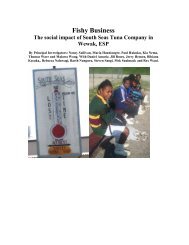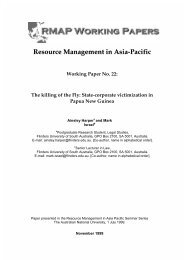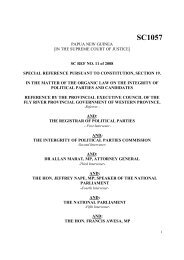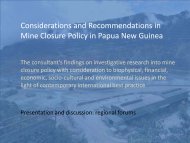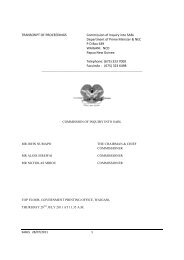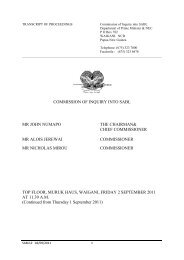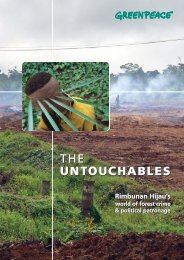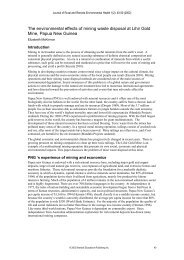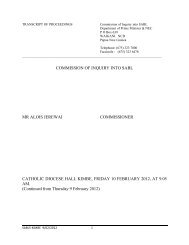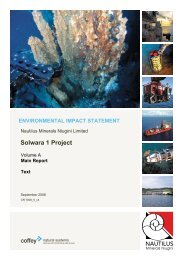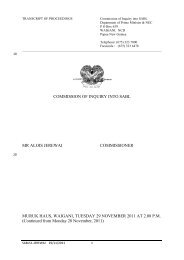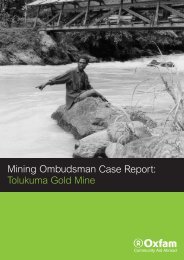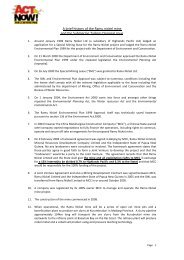Oxfam Australia and CAER: The right to decide
Oxfam Australia and CAER: The right to decide
Oxfam Australia and CAER: The right to decide
You also want an ePaper? Increase the reach of your titles
YUMPU automatically turns print PDFs into web optimized ePapers that Google loves.
Further guidance is provided by the Expert Mechanism on the<br />
Rights of Indigenous Peoples who defines FPIC as follows: 15<br />
• “Free” implies no coercion, intimidation or manipulation.<br />
• “Prior” implies that consent is obtained in advance of the<br />
activity associated with the decision being made, <strong>and</strong><br />
includes the time necessary <strong>to</strong> allow indigenous peoples <strong>to</strong><br />
undertake their own decision-making processes.<br />
• “Informed” implies that indigenous peoples have been<br />
provided all information relating <strong>to</strong> the activity <strong>and</strong> that<br />
the information is objective, accurate <strong>and</strong> presented in a<br />
manner <strong>and</strong> form underst<strong>and</strong>able <strong>to</strong> indigenous peoples.<br />
• “Consent” implies that indigenous peoples have agreed<br />
<strong>to</strong> the activity that is the subject of the relevant decision,<br />
which may also be subject <strong>to</strong> conditions.<br />
In 2003, the UN Special Rapporteur on the situation of human<br />
<strong>right</strong>s <strong>and</strong> fundamental freedoms of indigenous peoples<br />
clarified that this includes “the <strong>right</strong> <strong>to</strong> say No”. 16<br />
<strong>The</strong> elements of FPIC are interrelated, <strong>and</strong> set the conditions<br />
for the consent of indigenous peoples. <strong>The</strong> “free”, “prior” <strong>and</strong><br />
“informed” ensure a fair consent process. Violation of any of<br />
these three elements may invalidate any agreement said <strong>to</strong><br />
have been made between extractive industry companies <strong>and</strong><br />
indigenous peoples.<br />
FPIC requires respect for both traditional <strong>and</strong> contemporary<br />
representative structures, <strong>and</strong> the cus<strong>to</strong>mary laws <strong>and</strong><br />
practices of communities including their collective decisionmaking<br />
practices. FPIC processes must also involve the<br />
participation of both indigenous women <strong>and</strong> men. <strong>The</strong> <strong>right</strong><br />
<strong>to</strong> FPIC (<strong>and</strong> <strong>to</strong> participate in community decision-making<br />
processes) is not one held by men only. Women have equal<br />
<strong>right</strong>s, 17 including <strong>to</strong> participate in community decisionmaking<br />
processes, <strong>to</strong> benefit from development <strong>and</strong> <strong>to</strong> be<br />
safe from the potential negative impacts of mining. Yet<br />
it must be acknowledged that indigenous women often<br />
face exceptional impediments <strong>to</strong> participation in decisionmaking.<br />
18 Any supposed justifications based on culture<br />
for the exclusion of indigenous women is not consistent<br />
with international human <strong>right</strong>s st<strong>and</strong>ards <strong>and</strong> must be<br />
challenged — within many indigenous communities, women<br />
have (or traditionally had) important decision-making roles.<br />
Mining companies should not condone, <strong>to</strong>lerate or perpetuate<br />
discrimination against women, <strong>and</strong> should work <strong>to</strong> avoid the<br />
gendered impacts of mining 19 by ensuring the involvement<br />
of indigenous women in FPIC processes. This is best done<br />
by acknowledging <strong>and</strong> supporting the efforts of indigenous<br />
women <strong>to</strong> operationalise consent in a manner consistent<br />
with the <strong>right</strong>s of all members of their community. It should<br />
also be indigenous women (not the imposition of others)<br />
who <strong>decide</strong> how <strong>and</strong> when they should participate in<br />
decision-making processes, as well as their involvement in<br />
FPIC processes, based on the principles of equality, nondiscrimination<br />
<strong>and</strong> equity.<br />
<strong>The</strong> <strong>right</strong> <strong>to</strong> FPIC should be considered in the broader<br />
context of business <strong>and</strong> human <strong>right</strong>s. 20 <strong>The</strong> UN Protect,<br />
Respect <strong>and</strong> Remedy Framework on Business <strong>and</strong> Human<br />
Rights articulates the roles <strong>and</strong> responsibilities of both<br />
governments <strong>and</strong> businesses in relation <strong>to</strong> preventing <strong>and</strong><br />
addressing business-related human <strong>right</strong>s abuse. This<br />
framework has the support of governments, business <strong>and</strong><br />
civil society. It has three interlinked pillars:<br />
1. <strong>The</strong> state duty <strong>to</strong> protect against human <strong>right</strong>s abuses<br />
by third parties, including business, through appropriate<br />
policies, regulation <strong>and</strong> adjudication.<br />
2. <strong>The</strong> corporate responsibility <strong>to</strong> respect human <strong>right</strong>s,<br />
which means that businesses should act with due<br />
diligence <strong>to</strong> avoid infringing on the <strong>right</strong>s of others <strong>and</strong><br />
<strong>to</strong> address adverse impacts with which they are involved.<br />
3. <strong>The</strong> need for greater access by victims of businessrelated<br />
human <strong>right</strong>s abuse <strong>to</strong> effective remedy, both<br />
judicial <strong>and</strong> non-judicial.<br />
<strong>The</strong> UN Guiding Principles on Business <strong>and</strong> Human Rights 21<br />
developed <strong>to</strong> help support the Protect, Respect <strong>and</strong><br />
Remedy Framework explain that the corporate responsibility<br />
<strong>to</strong> respect human <strong>right</strong>s means business should avoid<br />
involvement in adverse human <strong>right</strong>s impacts, including<br />
through their business relationships. In other words,<br />
business should, as a minimum, do no harm. In practice this<br />
requires that businesses have a human <strong>right</strong>s policy that<br />
commits them <strong>to</strong> respect all human <strong>right</strong>s, implement a<br />
human <strong>right</strong>s due-diligence process <strong>to</strong> know <strong>and</strong> show that<br />
they are respecting human <strong>right</strong>s (requiring identification<br />
<strong>and</strong> assessment of impacts; integration of the findings of<br />
those assessments throughout corporate processes; <strong>and</strong><br />
tracking <strong>and</strong> communicating human <strong>right</strong>s performance),<br />
<strong>and</strong> work <strong>to</strong> remedy any adverse impacts they may have<br />
caused or contributed <strong>to</strong>, such as through a formal grievance<br />
mechanism.<br />
<strong>The</strong> state duty <strong>to</strong> protect, <strong>and</strong> corporate responsibility <strong>to</strong><br />
respect, relate <strong>to</strong> all internationally recognised human<br />
<strong>right</strong>s, including the <strong>right</strong>s of indigenous peoples. <strong>The</strong>re is<br />
no hierarchy of <strong>right</strong>s here — all human <strong>right</strong>s matter <strong>and</strong> all<br />
human <strong>right</strong>s require equal protection. <strong>The</strong>se <strong>right</strong>s include<br />
indigenous peoples’ <strong>right</strong>s over l<strong>and</strong> <strong>and</strong> natural resources,<br />
<strong>and</strong> <strong>to</strong> FPIC. Yet, as the Special Rapporteur has observed, 22<br />
there is a pervasive lack of underst<strong>and</strong>ing <strong>and</strong> conviction<br />
that the human <strong>right</strong>s that states must protect <strong>and</strong> business<br />
must respect includes the specific <strong>right</strong>s of indigenous<br />
peoples, especially those <strong>right</strong>s that are affirmed in the<br />
UNDRIP. This observation is confirmed by our research. As<br />
described in section three of this report, some <strong>Australia</strong>n<br />
mining companies do commit <strong>to</strong> respecting human <strong>right</strong>s or<br />
indigenous peoples’ <strong>right</strong>s but most s<strong>to</strong>p short of specifically<br />
recognising indigenous peoples’ <strong>right</strong>s <strong>to</strong> FPIC. This approach<br />
is inherently flawed as the respect for FPIC is necessary <strong>to</strong><br />
guarantee respect for indigenous peoples’ <strong>right</strong>s.<br />
15. Expert Mechanism Advice No. 2, 2011: Indigenous peoples <strong>and</strong> the <strong>right</strong> <strong>to</strong> participate in decision-making.<br />
16. Report of Special Rapporteur on the situation of human <strong>right</strong>s <strong>and</strong> fundamental freedoms of indigenous peoples, Stavenhagen 2003 UN Doc. E/CN.4/2003/90,<br />
paras 13 <strong>and</strong> 66.<br />
17. Convention on the Elimination of All Forms of Discrimination against Women.<br />
18. Final study on indigenous peoples <strong>and</strong> the <strong>right</strong> <strong>to</strong> participate in decision-making, Report of the Expert Mechanism on the Rights of Indigenous Peoples, A/HRC/<br />
EMRIP/2011/2, 26 May 2011.<br />
19. <strong>Oxfam</strong> <strong>Australia</strong>, Women, communities <strong>and</strong> mining: <strong>The</strong> gender impacts of mining <strong>and</strong> the role of gender impact assessment, 2009.<br />
20. Protect, Respect <strong>and</strong> Remedy: A framework for business <strong>and</strong> human <strong>right</strong>s, Report of the Special Representative of the Secretary-General on the issue of human <strong>right</strong>s <strong>and</strong><br />
transnational corporations <strong>and</strong> other business enterprises, A/HRC/8/5, 7 April 2008.<br />
21. www.ohchr.org/Documents/Publications/GuidingPrinciplesBusinessHR_EN.pdf<br />
22. Statement by James Anaya, Special Rapporteur on the <strong>right</strong>s of indigenous peoples, Forum on Business <strong>and</strong> Human Rights, 5 December 2012, Geneva.<br />
7



